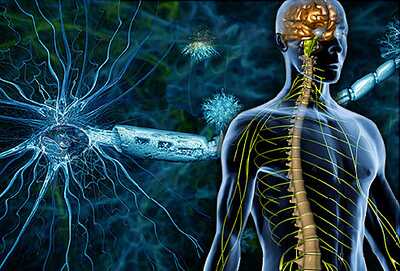Multiple sclerosis (MS) is a leading neurologic disease, affecting approximately 1 million people in the United States. Women are more affected than men (3:1), and it is more prevalent in whites than in other ethnic groups. Onset is usually between the ages of 20 and 40. MS worsens over time, with periods of remission and exacerbation (called relapses or flare-ups). With each exacerbation, additional areas of the CNS are affected. The interim between exacerbations becomes shorter as the disease advances, often signifying the relapsing pattern has changed to a more progressive course. Many people with MS become incapacitated over a period of 20 to 30 years.
MS is progressive degeneration and demyelination of neurons of the brain, spinal cord, and cranial nerves, especially the optic nerve. Loss of myelin ultimately leads to scarring or sclerosis and plaque formation, which interferes with nerve transmission (similar to an electrical wire stripped of its insulation). This process causes sensory and motor abnormalities. Cognitive dysfunction is very common in MS and may appear early in the disease course to include decrease in information processing speed, word finding, concentration, and attention.
Common signs and symptoms of MS are loss of vision; paresthesia (abnormal dermal sensations such as tingling, pricking, chilling, burning, itching, or numbness, either spontaneous or provoked); and peripheral neuropathy (damage to peripheral nerves – see later entry). The person experiences progressive muscle weakness, loss of coordination, postural instability, and eventual paralysis. Muscle spasms, fatigue, vertigo, and tremors are frequent manifestations. Speech and hearing impairments may develop. Bladder and bowel dysfunction occurs in 50-80% of MS patients.
Treatment goals are to reduce the frequency of exacerbation, delay disease progression, decrease disability, and to manage symptoms. Symptoms are managed with nonpharmacologic and pharmacologic methods (rehabilitation, energy conservation techniques, analgesics, muscle relaxants, immunosuppressants, antidepressants), as well as supportive therapies (physical, occupational and massage, speech). Regular moderate exercise in the early stages of the disease helps maintain muscle tone. Relapses are treated with corticosteroids.

Massage and Multiple Sclerosis – Massage is indicated for this condition (see research section below). Assess the client thoroughly at every visit because symptoms change from day to day. During periods of exacerbation, massage using light pressure can be performed. An example of light pressure is 3 on a 10-point pressure scale. If mobility devices such as a wheelchair are used by the client, read this blog titled Massage and Clients with Mobility Impairments.
![]() Research. A 30-minute Swedish massage to the lower limbs administered 3 times a week for 5 weeks was more effective than exercise therapy alone to reduce pain and improve dynamic balance and walking speed in persons with MS (Negahban et al, 2013).
Research. A 30-minute Swedish massage to the lower limbs administered 3 times a week for 5 weeks was more effective than exercise therapy alone to reduce pain and improve dynamic balance and walking speed in persons with MS (Negahban et al, 2013).
Pain reduction was greater when massage was combined with exercise therapy. A 45-minute Swedish massage administered twice a week for 4 weeks improved perceived overall health in multiple sclerosis patients (Schroeder et al, 2014).
A 40-minute massage administered twice a week for 10 weeks improved sensitivity and well-being and slightly improved in balance in patients with multiple sclerosis (Santos et al, 2015).
A 45-minute massage administered to people with MS twice a week for 5 weeks had lower anxiety, less depressed mood, improved self-esteem, better body image and image of disease progression, and enhanced social functional status (Hernandez-Reif et al, 1998).
A one hour weekly massage administered over 8 weeks improved the self-efficacy of clients with multiple sclerosis, potentially resulting in a better overall adjustment to the disease and an improvement in psycho-emotional state. Improvement in self-efficacy endured 4 weeks after the end of treatment, suggesting massage may have longer term effects on self-efficacy not previously noted (Finch & Bessonnette, 2014).
Massage administered once a week for 6 weeks reduced pain and fatigue in an individual diagnosed with MS (Backus et al, 2016). Sessions lasted between 30 and 60 minutes.
A 20-25 minute massage administered twice a week for 10 weeks improved sleep quality and self-efficacy among patients with MS (Mohebbi et al, 2019).
A 20-minute effleurage massage with either sweet almond oil or sweet almond oil blended with lavender essential oil administered 3 times a week for 4 weeks significantly decreased fatigue severity in women diagnosed with MS (Bahraini et al, 2011). A greater decrease was noted in the essential oil group.
Daily abdominal massage administered for 4 weeks by caregivers of people with MS lessened their constipation (McClurg et al, 2011). Once daily abdominal massage for 6 weeks reduced bowel dysfunction in persons with MS (McClurg et al, 2018).
A single 60-minute foot reflexology session (30 min each foot) reduced fatigue severity and anxiety in patients with MS (Ozdelikara & Alkan, 2018).
Steenkamp et al (2012) conducted a literature review and found evidence supporting the use of reflexology to improve of sensory and urinary symptoms associated with multiple sclerosis.
Picture Credits:
http://www.webmd.com/multiple-sclerosis/default.htm
http://www.giving.massgeneral.org/multiple-sclerosis-care-advances/
References:
Backus, D., Manella, C., Bender, A., Sweatman, M. (2016). Impact of massage therapy on fatigue, pain, and spasticity in people with multiple sclerosis: a pilot study. Int J Ther Massage Bodywork, 9(4), 4-13.
Bahraini, S., Naji, S.A., Mannani, R., Bekhradi, R. (2011). The comparison of the effects of effleurage massage with aromatic oil and nonaromatic oil on fatigue severity in women with multiple sclerosis. Journal of Urmia Nursing & Midwifery Faculty, 9(5), 1-11.
Finch, P., Bessonnette, S. (2014). A pragmatic investigation into the effects of massage therapy on the self-efficacy of multiple sclerosis clients. J Bodyw Mov Ther, 18(1), 11-16.
Hernandez-Reif, M., Field, T., Theakston, H. (1998). Multiple sclerosis patients benefit from massage therapy. J Bodywork Mov Ther, 2, 168-174.
McClurg, D., Hagen, S., Hawkins, S., Lowe-Strong, A. (2011). Abdominal massage for the alleviation of constipation symptoms in people with multiple sclerosis: a randomized controlled feasibility study. Mult Scler, 17, 223-233.
McClurg, D., Harris, F., Goodman, K., Doran, S., Hagen, S., Treweek, S., Norton, C., Coggrave, M., Norrie, J., Rauchhaus, P., Donnan, P., Emmanuel, A., Manoukian, S., Mason, H. (2018). Abdominal massage plus advice, compared with advice only, for neurogenic bowel dysfunction in MS: a RCT. Health Technol Assess, 22(58), 1-134.
Mohebbi, Z., Zarei, M., Homayouni, K., Zare, A. (2019). Studying the effect of effleurage massage on sleep quality and self-efficacy of patients with multiple sclerosis referred to the Fars MS Society. International Journal of Pharmaceutical Research, 11(1), 545-551.
Negahban, H., Rezaie, S., Goharpey, S. (2013). Massage therapy and exercise therapy in patients with multiple sclerosis: a randomized controlled pilot study. Clin Rehabil, 27(12), 1126-1136.
Ozdelikara, A., Alkan. S.A. (2018). The effects of reflexology on fatigue and anxiety in patients with multiple sclerosis. Altern Ther Health Med, 24(4), 8-13.
Santos, I., Laurito, G., Silva, M., Carruba, M., Leal, A., Barcala, L. (2015). Classical Massage in Multiple sclerosis. Manual Therapy, Posturology & Rehabilitation Journal, 13, 1-4.
Schroeder, B., Doig, J., Premkumar, K. (2014). The effects of massage therapy on multiple sclerosis patients’ quality of life and leg function. Evid Based Complement Alternat Med, 50(7), 640-657.
Steenkamp, E., Scrooby, B., van der Walt, C. (2012). Facilitating nurses’ knowledge of the utilisation of reflexology in adults with chronic diseases to enable informed health education during comprehensive nursing care. Health SA Gesondheid, 17(1), 1-12.

Dr. Susan Salvo is a massage therapist, author, educator, researcher, explorer, and perpetual student. To learn more, check out the “About Susan” tab. You can contact Susan at susansalvo@hotmail.com.


Reblogged this on lizchristianson.
LikeLiked by 1 person